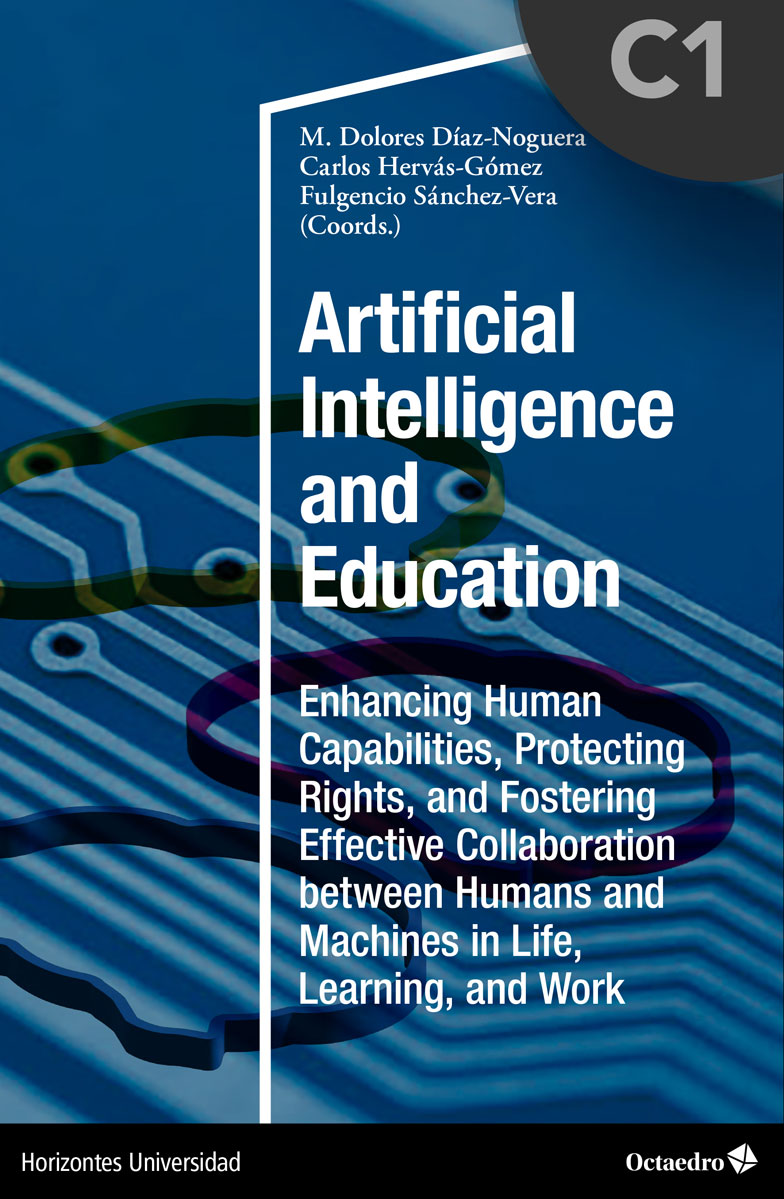FICHA TÉCNICA
Fecha de publicación:
06/11/2024
Doi del capítulo:
Título del libro: Artificial Intelligence and Education
URL del libro:
ISBN del libro: 9788410282452
DOI del libro:
Abstract
This chapter delves into the growing role of artificial intelligence (AI) within the context of academic integrity, focusing on the perceptions of university faculty in Spain. It highlights the importance of AI tool training for educators, illustrating how such training can not only enhance teaching and learning processes but also address ethical challenges related to using advanced technologies. Through a descriptive methodology based on survey data collection, the study uncovers a significant gap in understanding and effectively applying AI in educational settings, emphasizing the urgency for implementing specific training programs. Furthermore, the ethical implications of AI use, such as plagiarism, are discussed, proposing comprehensive strategies to prevent academic dishonesty. This analysis demonstrates the need for ongoing dialogue between technology and ethics, advocating for a more conscious and responsible integration of AI in higher education.
Palabras clave
Autores
Fulgencio Sánchez-Vera
Universidad de la Laguna, Spain
fsanchev@ull.edu.es
https://orcid.org/0000-0002-0697-9120
Inmaculada Perdomo Reyes
Universidad de La Laguna, Spain
mperdomo@ull.edu.es
https://orcid.org/0000-0003-4838-7278
Betty Estévez Cedeño
Universidad de la Laguna, Spain
bestevec@ull.edu.es
https://orcid.org/0000-0002-1590-952X
Cómo citar
Sánchez-Vera, F., Perdomo Reyes, I., Estévez Cedeño, B. (2024). Artificial Intelligence and Education: Is It Necessary, Is It Convenient?. In Díaz-Noguera, M. D., Hervás-Gómez, C., Sánchez-Vera, F. (Coords.), Artificial Intelligence and Education (pp. 13-30). Octaedro. https://doi.org/10.36006/09643-1-01
Referencias bibliográficas
«Chan, C. K. Y. (2023). Is AI Changing the Rules of Academic Misconduct? An In-depth Look at Students’ Perceptions of ‘AI-giarism’. arXiv.org. https://doi.org/10.48550/arXiv.2306.03358
Cotton, D., Cotton, P. A., & Shipway, J. (2023). Chatting and cheating: Ensuring academic integrity in the era of ChatGPT. Innovations in Education and Teaching International. https://doi.org/10.1080/14703297.2023.2190148
Dupps W. J. Jr. (2023). Artificial intelligence and academic publishing. Journal of cataract and refractive surgery, 49(7), 655-656. https://doi.org/10.1097/j.jcrs.0000000000001223
Giannini, S. (2023). La IA generativa y el futuro de la educación. UNESCO. https://unesdoc.unesco.org/ark:/48223/pf0000385877_spa
Liao, C., Palvia, P., & Lin, H.-N. (2021). The role of Artificial Intelligence in educational inclusion and equity. AI & Society, 36(3), 905-916.
Longoni, C., Tully, S., & Shariff, A. (2023). Plagiarizing AI-generated Content Is Seen as Less Unethical and more Permissible. https://doi.org/10.31234/osf.io/na3wb
Perkins, M. (2023). Academic integrity considerations of AI Large language models in the post-pandemic era: ChatGPT and beyond. Journal of University Teaching and Learning Practice, 20(2), 07.
Quidwai, A., Chunhui, L., & Dube, P. (2023). Beyond black box AI generated plagiarism detection: From sentence to document level. In Proceedings of the 18th Workshop on Innovative Use of NLP for Building Educational Applications (BEA 2023) (pp. 727-735). Association for Computational Linguistics.
Rodriguez, C. M. et al. (2023). Impact of Artificial Intelligence in Promoting Academic Integrity in Education: A Systematic review. Journal of Namibian Studies: History Politics Culture, 33, 71-85. 10.59670/jns.v33i.415
Santra, P. P. (2023). Scholarly communication and machine-generated text: Is it finally AI vs AI in plagiarism detection? SRELS Journal of Information Management. https://doi.org/10.17821/srels/2023/v60 i3/171028
Sarkar, A. (2023). Exploring perspectives on the impact of artificial intelligence on the creativity of knowledge work: Beyond mechanized plagiarism and stochastic parrots. In Proceedings of the 2nd Annual Meeting of the Symposium on Human-Computer Interaction for Work (CHIWORK ‘23). Association for Computing Machinery, 13. https://doi.org/10.1145/3596671.3597650
Sullivan, M., Kelly, A., & McLaughlan, P. (2023). ChatGPT in higher education: Considerations for academic integrity and student learning. Journal of Applied Learning & Teaching, 6(1). https://doi.org/10. 37074/jalt.2023.6.1.17
UNESCO (2019a). Artificial Intelligence in education: Challenges and opportunities for sustainable development. UNESCO. https://unesdoc.unesco.org/ark:/48223/pf0000366994?posInSet=1&queryId=3caae4dd-9ae6-4a04-9fe6-a7f3f0a7e725
UNESCO (2019b). Beijing Consensus on Artificial Intelligence and Education. UNESCO. https://unesdoc.unesco.org/ark:/48223/pf000036 8303
UNESCO (2021a). Inteligencia artificial y educación. Guía para las personas a cargo de formular políticas. UNESCO. https://unesdoc.unesco.org/ark:/48223/pf0000379376
UNESCO (2021b). Recomendación sobre la ética de la inteligencia artificial. UNESCO. https://unesdoc.unesco.org/ark:/48223/pf0000381 137_spa
Waltzer, T., Cox, R.L., & Heyman, G. D. (2023). Testing the ability of teachers and students to differentiate between essays generated by ChatGPT and high school students. Human Behavior and Emerging Technologies, Article ID 1923981 https://doi.org/10.1155/2023/192 3981
Yeo, M. (2023). Academic integrity in the age of Artificial Intelligence (AI) authoring apps. TESOL Journal, 14(3), 1-12. https://doi.org/10. 1002/tesj.716»
